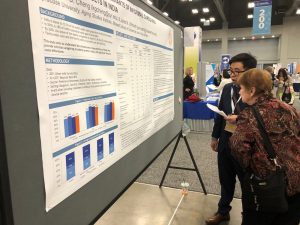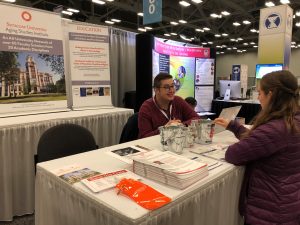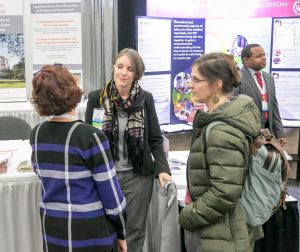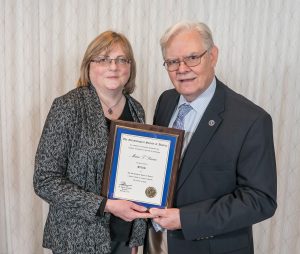ASI Faculty and Students Presented their work at the 2020 Gerontological Society of America Conference, that was held Nov 4-7. https://www.geron.org/ Link
Schedule of synchronous sessions involving Syracuse University faculty and students: Link
Wednesday, November 4 Link
1:45 PM – 2:15 PM EST
Veteran Status Matters! Life Course Perspectives on the Health and Well-Being of Aging Veterans: Presenter Discussion
Risk Aversion Among Male Older Adults: Does Veteran Status Matter?
Kent Jason G. Cheng, MA – Syracuse University, Scott Landes – Syracuse University, and Janet Wilmoth – Syracuse University
Diurnal Cortisol Profiles and Veteran Status
Jennifer R. Piazza – Public Health, California State University, Fullerton, Scott Landes – Syracuse University, and Natalia Dmitrieva – Northern Arizona University
Thursday, November 5 Link
11:30 AM – 12:30 PM EST
ASI Booth: Video Chat
Janet Wilmoth – Syracuse University
12:45 – 1:15 PM EST
(2938-B) Isolation and Loneliness 2: Presenter Discussion
Family Solidarity, Social Support, Loneliness, and Well-Being Among Older Adults in Rural China
Xiaoyan Zhang – Syracuse University and Merril Silverstein – Syracuse University
1:45-2:15 PM EST
(2870) Transportation: Presenter Discussion
Visitation Access to U.S. Nursing Homes: An Analysis of Facility Locations, Ratings, and Disparities
Mary E. Helander – Syracuse University
1:45 – 2:15 PM EST
(2943-B) Family and Cross-Generational Relationships 2: Presenter Discussion
Grandparenting and the Receipt of Filial Piety From Adult Children in Chinese American Families
Jeung Hyun Kim – Syracuse University
2:45 PM – 3:15 PM EST
Rural Aging: Multidisciplinary, Multinational Innovations That Support New Approaches to Address Unmet Needs: Presenter Discussion
How Area Agencies on Aging Contribute to Social Connection for Older Adults in Rural America
Claire Pendergrast – Syracuse University
3:45 PM – 4:30 PM EST
Gerontology at the Intersection of Religion and Families: Honoring the Legacy of Vern Bengtson: Streaming Symposia
Tracing the Religious Life Course: Intergenerational Sources of Later Life Religiosity.
Merril Silverstein – Syracuse University, Woosang Hwang – Syracuse University, and Joseph Blankholm – University of California, Santa Barbara
This GSA streaming symposium is co-organized by Merril Silverstein. Additional papers will be presented by Andy Achenbaum, Ellen Idler, Linda George, and Robert Taylor.
Friday, November 6 Link
11:30 AM – 12:30 PM EST
ASI Booth: Video Chat
Karen Cimilluca – Syracuse University
12:45 PM – 1:15 PM EST
Intergenerational Caregiving and Relationships: Presenter Discussion
Multidimensional Profiles of Religiosity Among Grandparents, Parents, and Grandchildren
Joonsik Yoon – Syracuse University, Woosang Hwang – Syracuse University, Merril Silverstein – Syracuse University, and Maria Brown – Syracuse University
12:45 – 1:15 PM EST
(2945-A) Caregiving (BSS) 5: Presenter Discussion
Assessing the Impact of Older Americans Act–Funded Services on Caregiver Stress
Racheal Chubb – Syracuse University and Janet Wilmoth – Syracuse University
1:45 – 2:15 PM EST
(2943-C) Family and Cross-Generational Relationships 3: Presenter Discussion
Multidimensional Profiles of Religiosity: Do they Matter for Gen-Xer’s Psychological and Familial Well-Being?
Kent Jason G. Cheng – Syracuse University, Woosang Hwang – Syracuse University, Jeung Hyun Kim – Syracuse University, Merril Silverstein – Syracuse University, and Maria Brown – Syracuse University
3:45 PM – 4:15 PM EST
Caring for Older Parents: Presenter Discussion
Reciprocal Associations Between Normative, Affectual, and Associational Solidarity With Parents in Young Adults
Jeung Hyun Kim – Syracuse University, Woosang Hwang – Syracuse University, Kent Jason G. Cheng – Syracuse University, Maria Brown – Syracuse University, and Merril Silverstein – Syracuse University.
3:45 PM – 4:15 PM EST
Gender- and Sex-Centered Topics in Aging: Presenter Discussion
Can Women Have It All: Marriage, Family, Career, and Good Health?
Julene Cooney – Syracuse University
Saturday, November 7 Link
12:45 PM – 1:15 PM EST
Mental Health and Older Adults: Presenter Discussion
Psychiatric History and Trajectories of Cognitive Change Predict Risk of Nursing Home Residence
Maria T. Brown – Syracuse University
1:45 PM – 2:15 PM EST
Mobility, Disability, and Functional Impairment: Presenter Discussion
The Mediating Role of Optimism on the Relationship of Activities of Daily Living and Well-Being Among Older Adults
Kent Jason G. Cheng – Syracuse University, Darcy McMaughan – Texas A&M University, and Matthew L. Smith – Texas A&M University
2:45 PM – 3:15 PM EST
Social Support and Psychological Well-Being: Presenter Discussion
Intergenerational Relationships, Social Support, and Psychological Well-Being Among Korean Older Adults
Yooumi Lee – Syracuse University and Janet Wilmoth – Syracuse University
2:45 PM – 3:30 PM EST
Policy Series: ESPO/ Social Research, Policy, and Practice Section Symposium: Connecting Aging Research to Policy: Insights and Strategies for Early-Career Researchers: Streaming Symposia
This session is co-chaired by Claire Pendergrast.

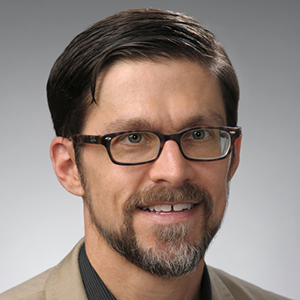
 Madonna Harrington Meyer was quoted in two articles that nearly 70 media outlets picked up. The NPR article,
Madonna Harrington Meyer was quoted in two articles that nearly 70 media outlets picked up. The NPR article,
 Shannon Monnat, and the Lerner Center staff and graduate students, have produced an excellent series of Lerner Center Population Health Research Briefs on COVID-19, several of which focus on the older population. Contributing authors include Shannon Monnat, Madonna Harrington Meyer, Scott Landes, Dalton Stevens, Kent Cheng, and Yue Sun.
Shannon Monnat, and the Lerner Center staff and graduate students, have produced an excellent series of Lerner Center Population Health Research Briefs on COVID-19, several of which focus on the older population. Contributing authors include Shannon Monnat, Madonna Harrington Meyer, Scott Landes, Dalton Stevens, Kent Cheng, and Yue Sun.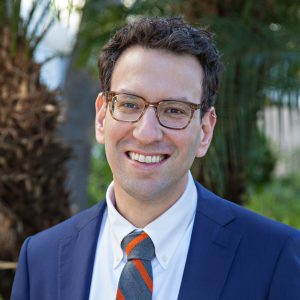

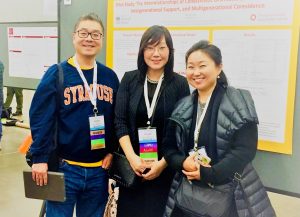 Ph.D. students Joonsik Yoon, Yooumi Lee & ASI Alumna Dr. Hee-Seung Lee
Ph.D. students Joonsik Yoon, Yooumi Lee & ASI Alumna Dr. Hee-Seung Lee